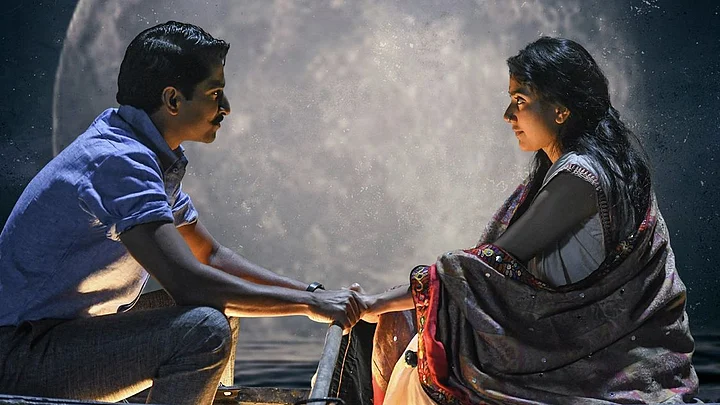The title has made it clear that whatever Vasu (Nani) does at the beginning of the movie is just the part where you’re served the hors d'oeuvres. The real meal arrives later, and the wait is worth it. I can surely say that 2021 is ending on a good note as far as Telugu cinema is concerned. On the one hand, there’s Pushpa, a money-spinner, and on the other, there’s Shyam Singha Roy that tries to aesthetically elevate the narrative at every given opportunity.
I wonder why Rahul Sankrityan, the director, didn’t make a full-length feature based on the eponymous protagonist (portrayed by Nani, again) alone. The reincarnation plot wouldn’t have worked then obviously. And Singha Roy would have had to deal with his problems differently.
But there’s some kind of magic in a period film that one can’t look away from, especially when it’s well-made. Imagine walking through forests and bathing in rivers without feeling the constant urge to record it on mobile phones. Of course, technology helps us a lot. I can’t spend a day without turning my laptop on now. But for the sake of nostalgia and this movie, we should all go back to the 70s.
Singha Roy is a writer who harbours the notion of changing the world around him through the power of words. Isn’t that every writer’s dream? People either write to understand their own feelings better or to make others confront their feelings.
Here comes the curveball though – he doesn’t pick up the pen to merely entertain his readers. He’s a leftist who grows his moustache à la Bhagat Singh. And he wears his political beliefs on his sleeve. In the scene where he’s introduced, he helps Dalits get their share of water from a well. But this isn’t a movie that’s solely interested in highlighting the dirtiness of casteism.
If you think about it for a moment, casteism hasn’t gone anywhere. It’s still here. Even in the third decade of the twenty-first century, there are people who belong to the upper caste that refuse to eat food cooked by Dalits. Ah, how can we drive bigotry away?
In a way, Singha Roy has a saviour complex – he comes up with quick-fix solutions whenever he stumbles upon a social evil. There is also, perhaps, a sense of pride in the manner in which he operates. For example, he knows he’s a gifted writer.
You don’t see him worrying about what to write, or how to put his innermost thoughts on paper. Stories flow out of the tip of his pen easily. Some writers are capable of doing that – American writer Jack Kerouac springs to mind.
Beyond these incorruptible touches, however, there’s one grand love story at the heart of Shyam Singha Roy. And that’s where Rosie (Sai Pallavi) comes in. It’s not an apt name for her character, but Singha Roy gives it to her anyway and she seems to like it, too. What’s hilarious about this particular timeless tale of love is that he calls himself an atheist and, yet, worships Rosie. And I must admit I did, as well.
Pallavi is breathtakingly gorgeous in the dance sequences and I can’t think of another actor who can pull off such a feat. In terms of sheer screen presence, she’s right on top. And when it comes to her lightning moves, there’s nobody to beat her at this game. She makes the art of dancing look like child’s play. You can come up with a list of names to replace Nani and you can even argue whether or not their performances would be outstanding, but it’d be a Sisyphean task to imagine anybody else in Rosie’s shoes.
Pallavi has played strong-willed characters on screen before. And she has also slipped into the skin of vulnerable women. In Shyam Singha Roy, she plays both. When she’s dancing in a temple, she seems like a ruthless goddess. And when she sneaks out of the same temple at night to meet her boyfriend, she becomes another person altogether.
Sankrityan tackles patriarchy and other such evils in one stroke. However, since it’s just a section of the film, he doesn’t get enough time to chew on those pressing issues. And this is why I didn’t prefer the romantic track, featuring Vasu and Keerthy (Krithi Shetty) much. I wanted to know more about Rosie’s day-to-day life.
Nevertheless, Sankrityan is a promising filmmaker and he’s here to stay. He makes use of supernatural elements in telling exciting stories. He appears to have taken inspiration from Adurthi Subba Rao’s 1964 Telugu classic Mooga Manasulu and Satyajit Ray for his latest drama. Oh, and before I end this review, I’d like to add that I quite adored the cyclical effect he brings to Nani’s two characters. If Singha Roy writes to quench his philosophical thirst, Vasu quits his job to become a director. After all, isn’t filmmaking an offshoot of writing?
(At The Quint, we question everything. Play an active role in shaping our journalism by becoming a member today.)
